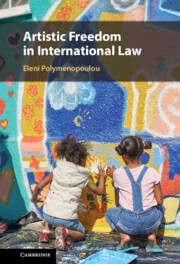Book contents
- Artistic Freedom in International Law
- Artistic Freedom in International Law
- Copyright page
- Contents
- Acknowledgements
- Table of Cases
- Introduction
- 1 Defining Art
- 2 The Nature, Scope and Protection of Artistic Freedom
- 3 Censorship and Restrictions
- 4 Positive Obligations in Relation to Artistic Freedom
- 5 Street Art, Graffiti and Art in Public Space
- 6 Public Morality, Obscenity and the Arts
- 7 Blasphemous Paintings, Cartoons and Other Religiously Offensive Art
- Index
1 - Defining Art
Published online by Cambridge University Press: 06 April 2023
- Artistic Freedom in International Law
- Artistic Freedom in International Law
- Copyright page
- Contents
- Acknowledgements
- Table of Cases
- Introduction
- 1 Defining Art
- 2 The Nature, Scope and Protection of Artistic Freedom
- 3 Censorship and Restrictions
- 4 Positive Obligations in Relation to Artistic Freedom
- 5 Street Art, Graffiti and Art in Public Space
- 6 Public Morality, Obscenity and the Arts
- 7 Blasphemous Paintings, Cartoons and Other Religiously Offensive Art
- Index
Summary
This chapter explores the concept of ‘art’ from the perspective of law, art history and aesthetics. Drawing on examples from the visual arts, it discusses the concept of ‘art’ in light of Plato’s philosophical ideas, Weitz’s argument about art as an ‘open concept’, Danto’s philosophical investigations and the ‘institutional theory’ of the art. It further draws upon various areas of international law, including cultural heritage law and intellectual property law, in order to demonstrate that a precise definition of ‘art’ is not offered at present in any international instrument. The chapter further examines the legal challenges arising from the ‘non-definition’ of the concept of ‘art’, questioning the validity of the argument of artistic freedom as an exception to rules of general application. Last, the chapter details the need for legal protection against abuses and potential dismissal of artworks as ‘non-art’, in instances where the qualification ‘art’ (and consequently the question of artistic merit) plays the role of a ‘defence’ against attempts to interfere with freedom of speech.
Keywords
- Type
- Chapter
- Information
- Artistic Freedom in International Law , pp. 10 - 37Publisher: Cambridge University PressPrint publication year: 2023

